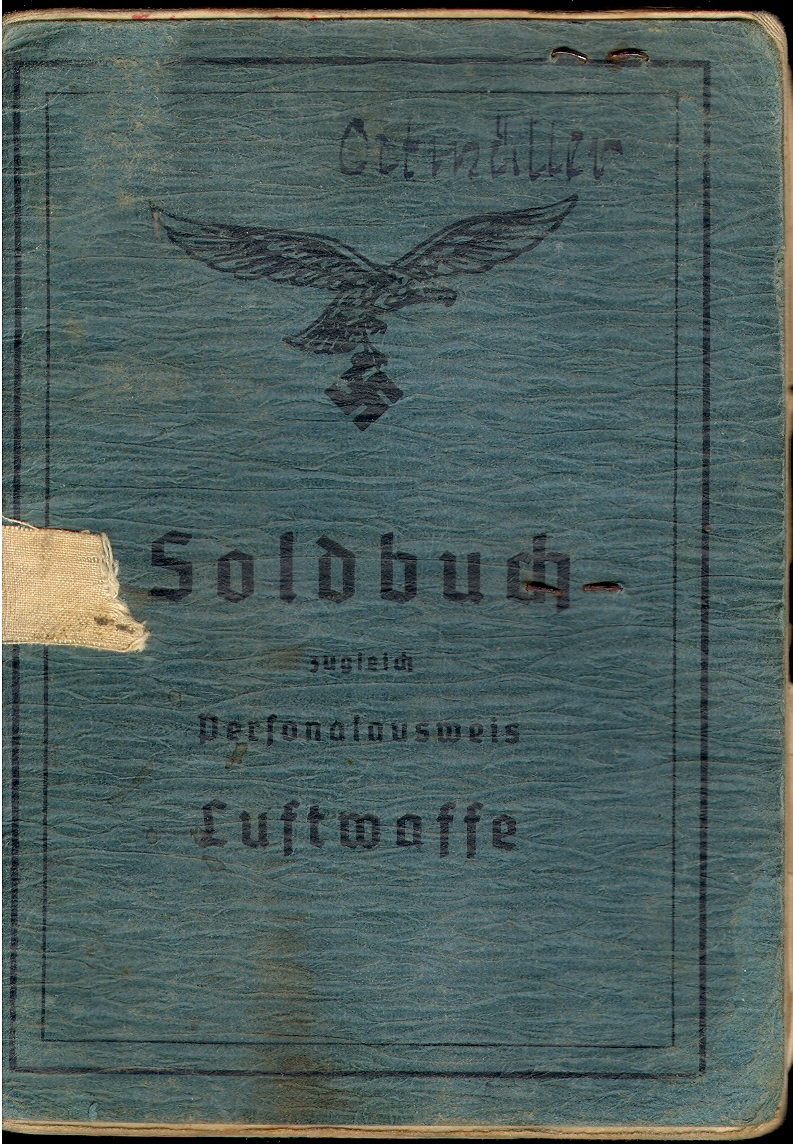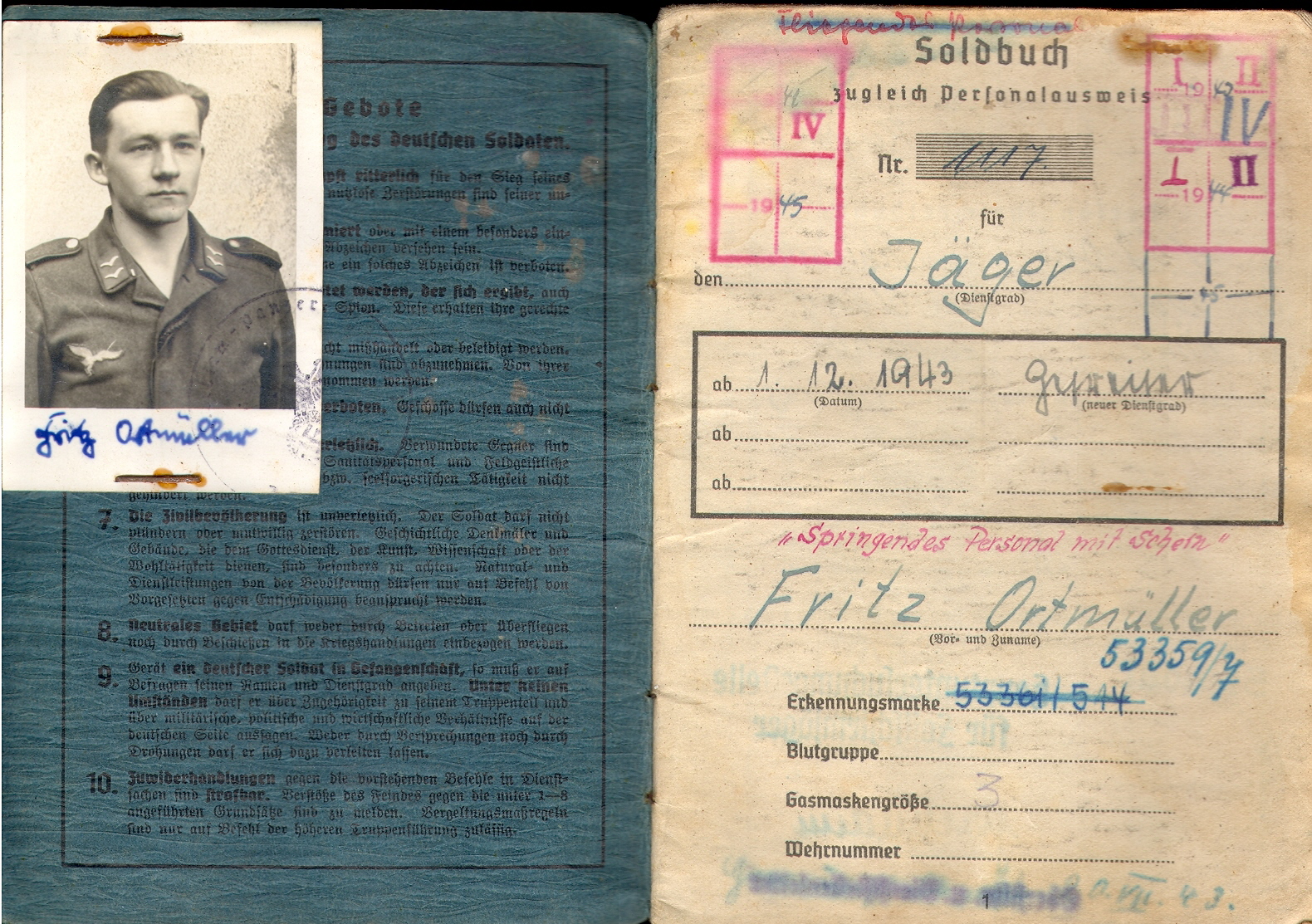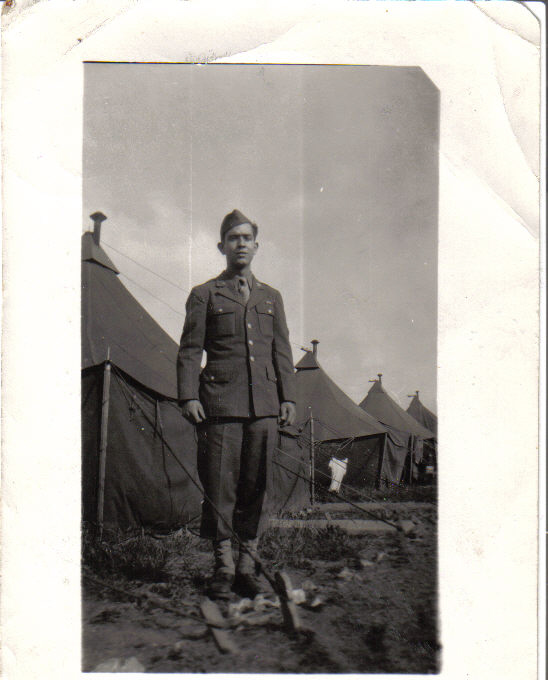Interview on the Diary of Abelardo Alameda
How did you find out you were being drafted? What were you doing at the time you were drafted? (job?) How did the draft work?
I was notified through the mail. I was working at Kelly when I was drafted either working already or I had gone through a training of what they call a mechanics learner at Kelly.
What was that?
It was a program to show you skills and then once you finished your skill you were assigned to wherever they put you.
But how did the draft work?
Well as far as I know it was a committee of men. I think it was just men I don't know for sure, and they decided who would be drafted and who wouldn't be drafted. But committee picked the boys mostly young boys.
Ok you went to Chanute field to take a parachute course. What did you learn at the parachute course? And how long did that course last?
Well I learned how to sew, how to tear down the machines the sewing machines and put them back together we repaired parachutes learned how to repair parachutes how to tear down the machine and then put it back together. (Long pause to think back) The course must of lasted I don't know for sure but at least no less than a month but maybe two months. And the instructors there at the school at Chanute came from well a lot of them came in from (pauses to think) Illinois University.
So on you left overseas on August 21st at a port. What port did you depart from and what was the trip to England like?
The port was Newport News its somewhere up east. Well the trip going into England was well it was on a ship a big ship very big ship called the U.S.S Argentina it was converted to a troop ship see prior to that it was a luxury boat and then they somehow contracted it. And the cabins at that time had four cots I think it was four or five from the floor all the way to the ceiling and going over there we stopped at Newfoundland and stayed there about three days more or less three days. We went to St. John Newfoundland we had to go there cause there were submarines around and the ship was all by itself and they were afraid that the submarines might attack the boat so that why they went into port. At the beginning the weather wasn't too to bad then about three days out in that water and it was cold outside and so what they did they put all the people all the soldiers that were sleeping outside sleeping on the deck inside and it was crowded I believe there was five thousand troops on that one boat.
So you arrived on September 5th and got your field assignment. What was our field assignment?
The parachute shop we repaired the parachutes we installed the life rafts and assembled the survival belts.
So you received letters while over in Europe? Who did you receive letters from during the war? What did people write about in the letters and do you still have any of those letters today?
Well my mother and my sisters (laughing) they wrote about the usual that they missed me and that they were praying for everybody but I don't really remember what they said on the letters. My mother wrote to me in Spanish and my sisters in English.
Do you still have any of those letters?
No they are gone I didn't keep nothing hardly anything.
Did you ever write back to them?
Yeah, I wrote back I wrote to my mother in Spanish and my sisters in English and that's the only ones I can remember that I would write.
You wrote down here that you went to Town to go after coal in Hungerford. What did you need coal for?
For the tents for heat.
Ok you got a pass for London. What did you do in London and was it being bombed at that time by the Germans?
I went out on the town and looked at the girls. (laughing) Some sections were being bombed that's when I got under that tree you know I was in one block and then there was squadron of Germans one block or two blocks further down and they had a pattern going straight on that section see and I was two block maybe one block when they got the alert on the bus we were riding so we got off and there was two girls with us at that time me and Dan and we didn't know where we were so we saw a tree and got under the tree that's all we could do.
You wrote here that you were on detail all day. What did you do on detail?
Well on detail I remember that it was on base well the outer area of the base it was like a circle, and we would patrol the outside. There were several we were assigned and we would meet at a certain place and report if there was anything out of the ordinary to whoever was in-charge. I don't remember who and we kept that up and ugh and also we would patrol the outside of the base and we would also patrol the ramp were the plane were at different times not at the same night. And they would also have me on KP working the kitchen moping, help the cooks and cater the tables it all depends on what your skill was and that's about it.
Everyone went to the lines. What was done on the lines?
We would go work on the planes that came in the mechanics the radio man life support like me. One time in England I think it was in England a plane went down and crashed almost in the base you know but right outside the runway and there were seven guys that were killed and I remember they were put into sacks. Working with the engineers loading the cement sacks.
What was done with the cement sacks?
They were making runways they had a crew a guy would open sacks and put them in the were they mix them by hand mostly and the trucks would bring the cement the guys would unload it another guy would cut the cement and load it into the mixer and then they would put them on special made tractors with a special made bucket or whatever and take it to the runways making the runways and we would work day and night.
You started working in the hanger. What was done in the Hangers?
Well we opened up a shop a parachute shop you know we would fix the chutes there and anything that had to do with what they called life support. If they needed jackets and parachutes we used to make jackets from scratch but not over there we used to do that here at Kelly.
You put here that you went to commando training and infiltration training. What was done in the trainings?
They taught us how to infiltrate the German lines in case you had to you learned how to defend yourself how to go into the German lines. The training consisted of going into the ground and crawling and somebody would be shooting on top of you so you better not get up (laughing) cause those guns were stationary they couldn't move they were special guns to give you feel of what the bullets sounded like and also to learn how to crawl. They gave us small books of basic German words showed us how to crawl through barbed wires and also some places you would crawl they had bombs in the ground but they made sure you were not gonna be on top of those things they were small bombs not big ones they were for training they taught us the feeling of a bomb going off.
What happened during an air raid?
(Laughing hard) I told you I lost those two girls in London. Well then when we were in London they had air raid sounds every night almost and they would pick sections. Later on afterwards a few months later they came out with what they called the V-1 bombs buzz bomb and when the buzz bomb was going over your head you could see the fire in the back and hear a little motor and as long as that little motor was going you knew it wasn't gonna fall and one time we were in tents getting ready to go to sleep and we heard this bomb coming then all of a sudden it quit right on top of us and we had these fox holes around the tent to jump in case something would happen and we all jumped as fast as we could (laughing) cause the motor went out and it hit right by us by these two big homes and when it finished exploding there was no homes and then like I said we were in the holes and we could feel the little rocks falling on us and when you're new to this you get scared so you get up and you touch your body just to see if your there. (laughing).
June 6th 1944 D-Day. Where were you during D-day?
I was in England during the d-day and we were ugh outside the port of ugh I forget the name of the port but we were on a boat getting ready to go to France cause it was only a matter of two days and we landed on Normandy on the third day I think I don't remember but we left from what I think they called Southampton.
Around this time in your diary you left a lot of question marks. Why are there question marks?
Well we couldn't discuss everything in detail so we had to cut it down to what we could understand in our own writing so maybe the guys that got a hold of the book wouldn't know what we were talking about.
Did you know what you were talking about?
In some cases yes(laughing).
So you wrote still at M. What is M for?
I can't remember.
Left at noon for port. What port and where were you going?
Well we left from south Hampton and arrived in France.
So you arrived in France and got moved to?? Where was this question mark place? And 16 miles from? Elaborate.
It was apple orchards we set up camp it was sixteen miles from the beaches of Normandy.
You wrote that it was noisy at night. What was causing the noise? How close were you to the front?
The bombing and also the shooting on the beach of Normandy. Sixteen miles. (laughing) The line keeps on moving. Nothing is stationary. Like in Normandy when they landed they used to call them troopers Special Forces they would train to go into those places and throw them bombs you know hand bombs grenades. In Normandy the beach the Germans were already waiting for the Americans and they had some bunkers and they got guns inside the bunkers the Germans and from inside the gun was just sticking out the nose and they would shoot the hell out of everybody and they didn't know who they were hitting there was thousands of people.
July 24th 1944 you got more letters in the mail. Who wrote to you this day. and you played ball, baseball right?
My sisters, mother friends and maybe a girlfriend I can't remember. Yes baseball and we used to box I used to box the other guys. (laughing) I remember I used to box with this guy by the name of Goodman and this guy was tall he was six something big ole guy and I used to box with him and he used to knock me down all over the place (hahaha) and that's all I can remember but he was big I wasn't afraid of him I could take a punch at that time and now I can't even take one from the baby (still laughing).
What are the Typhoons?
They were fighter planes. I don't remember if they were American planes or English planes.
You put "went to the GAP and saw plenty of knocked out German tanks." Where is the GAP and what did they do with the tanks and the bodies?
It was Falaise GAP the bodies were picked up the Americans had the first choices then the Germans they tried to identify as many as they could and the tanks they couldn't move they had to get special equipment but I was gone by that time.
"September 11th 1944 reported to regular work." What was regular work?
Parachute shop back at the base I imagine.
"September 18th left for a new base." What base were you going to?
Reims well it was a town I think but we called it Reims. It's R-E-I-M-S. I imagine it's where they signed the surrender Churchill and Eisenhower. They say it was known as the Randolph of France.
You say the base was really wrecked. How was it wrecked?
It was bombed.
"October 23rd 1944 Lt. Depree killed in an accident best officer we ever had. Best pilot." Who was Lt. Depree? How was he killed?
He was a pilot (laughing) but Lt. Depree when I was in England he would let me go up in the plane with him as the scanner to patrol the areas of the base the waters and not only me there was a whole and the plane at that time was known as the B-29 we called it the flying coffin cause they would fall more than the average.
So you would get in them?
Yeah, I never been afraid of anything.
Sounds like a crappy plane?
No, it was a good plane but that was the only thing bad with it (laughing) we had guns that thing was loaded. The shells the guns were in the two turrets (I missed my show laughing) like I said I was the scanner I was here and the other guy by the next wall and another guy over there over there we could see all this area on this side and the tail gunner in the back and of course the pilots were in the front we had well not only that plane we had other planes sent in that area to scan and if you saw another plane I forgot the code but you would let them know if there was an enemy plane on the left wing or right wherever you were sitting.
How was Lt. Depree killed?
In the plane I don't remember how he got killed cause he could fly all the planes but I'm more than sure it was in a plane not to sure if it crashed with another plane or if it just fell down.
Armistice was signed May 8th 1945. Then May 9th you went to Leige. Where were you when it was signed and where is Leige?
I was in Germany I left a month before it was signed. Leige was in Belgium.
"June 22nd 1945 left Germany for the States arrived in New York on the 6th of July left camp New York for camp twenty grand." Where is camp twenty grand and what was the trip back like?
I don't remember. We came back on what is known as liberty ships smaller ships then the Argentina it rocks the liberty ship rocks a lot it was a small boat but we had more room but it rocked it was one-third maybe one-fourth the size of the Argentina.
After you left camp twenty grand how long were you in Ft. Sam Houston and what did you do when you came back?
Not too long like two days I took off a few days cause I needed a vacation! Then went back to Kelly put in another application and went back, but it was hard to get back because I am a Mexican, so they wouldn't let me in. But they had to let me back in because of a government law.


PALO ALTO COLLEGE
SAN ANTONIO, TEXAS

